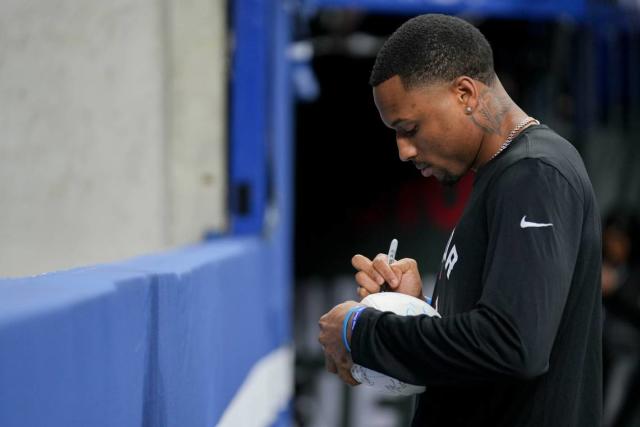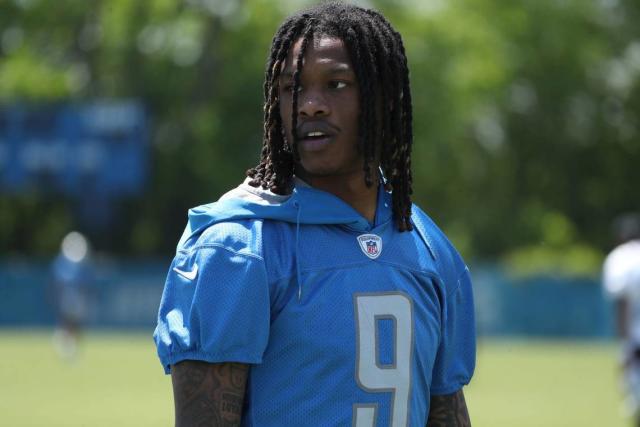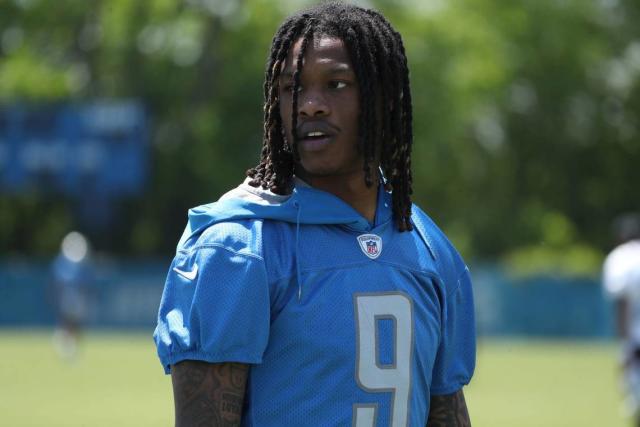Across the United States, access to sports betting is easier than ever.
It’s legal in 37 states, most of which allow people to place wagers from their phones. And the NFL, once an adversary of the movement to make sports betting widespread, has now fully embraced it.
However, with nine players penalized just this year for violating the league’s gambling policy, the NFL is more so now than ever forced to walk the tightrope of managing multi-million dollar partnerships with sportsbooks and protecting the game’s integrity.
Over the past four years, the number of players punished for violating the policy has tripled, including eight indefinite suspensions of at least one year for placing bets on NFL games.
In March 2022, then-Atlanta Falcons wide receiver Calvin Ridley became the first player to be suspended for placing a bet on a mobile app. Ridley, now a member of the Jacksonville Jaguars, received an indefinite suspension for including Atlanta in his wagers. He was reinstated in April.
In the last few months, the NFL has announced multiple suspensions for violations of the policy, including an indefinite suspension for Indianapolis Colts cornerback Isaiah Rodgers, who reportedly placed dozens of bets on NFL games and won $1,000 from a prop bet on a teammate.
Before 2019, it had been 36 years since an NFL player was suspended for gambling.
But the world was much different 40 years ago.
‘A pandemic of gambling’
The Professional and Amateur Sports Protection Act (PASPA), a federal law that had restricted regulated sports betting only to Nevada since 1992, was overturned by the Supreme Court in 2018, allowing each state to decide whether it wants to authorize sports betting. It is a decision that irrevocably altered the landscape of sports betting.
Commercial sports betting revenue reached $3.67 billion through April, according to the American Gaming Association, surpassing the same period’s total last year by 69.1 percent.
The NFL, which was a plaintiff in the case and strongly opposed the legalization of sports betting, subsequently revised its strict policy that previously prohibited players from wagering on any sports.
Since the ruling, the NFL has submerged itself in the sports betting industry, partnering with sportsbooks such as FanDuel, DraftKings and BetMGM.

As a result, the league now has monitoring technology to track who made bets and where they were placed. This had led to more and more players since 2018 getting detected and having to face consequences.
Peter A. Carfanga, sports law director at the University of Miami, believes the uptick in violations is “directly related to the legalization of sports gambling.”
“It’s almost like a pandemic of gambling,” he told the Miami Herald in a phone interview. “State after state after state started legalizing sports gambling. It’s omnipresent, and 56 percent, I think, of the U.S. population resides in a jurisdiction that would have a regulated sportsbook. It’s more prevalent than it’s ever been before in American history.”
What does the NFL’s gambling policy actually say?
About a week before the NFL levied its latest punishment for violations of the gambling policy in June, it held a virtual news conference where it shared similar information that has been presented to teams on the policy.
Among the rules are six major points:
-
Don’t bet on the NFL.
-
Don’t gamble at your team facility, while traveling for a road game or staying at a team hotel.
-
Don’t have someone bet for you.
-
Don’t share team ‘inside information.’
-
Don’t enter a sportsbook during the NFL playing season.
-
Don’t play daily fantasy football.
Six-game suspensions have typically been levied for placing non-NFL bets while on team grounds while betting on NFL games has resulted in an indefinite suspension.
Coaches and staff members are also prohibited from betting on any other sports, including team sports (MLB, NBA, etc.), individual sports (PGA, ATP, etc.), college sports, multi-sport parlays, international sports or tournaments and March Madness bracket contests.
“To condition employment on not sports betting, it helps prevent addictive behavior and it also makes it more controllable that bad people will not have leverage over NFL players,” Carfanga said.
Although the policy is not a part of the collective bargaining agreement, the NFL Players Association’s input was taken into consideration by the league.
While the spate of punishments for violations could be a black eye for the league — and seemingly hypocritical given its lucrative deals with sportsbooks — it’s also been career-altering for some of the perpetrators.
Rodgers is among multiple players who have since been released from their team after being punished for violations.
What is the NFL doing now?
Jeff Miller, NFL executive vice president of communications, said the league educates around 17,000 people annually — from players and coaches to stadium workers — on the do’s and don’ts of the league’s gambling policy.
Detroit Lions wide receiver Jameson Williams, who received a six-game suspension in April along with several other players for placing a wager on non-NFL games while on team property, claimed he was not aware that it was a violation of the policy.
As violations have become public, the NFL has been making in-person visits to team facilities — the league visited the Dolphins’ facility during minicamp in June — to reemphasize what league personnel can and cannot do. The league also now requires all rookies to go through mandatory educational training on the policy.

During these discussions, several players have sought clarity regarding the prohibition on placing bets while inside any team or league facility, said Sabrina Perel, vice president and chief compliance officer.
“We want to be very clear here in talking about the rule about not gambling at work,” Perel said. “We’re very clear in terms of saying, whether that’s on premises at the team facility, at the stadium, or while they’re traveling on road games, going on the bus, they’re in the plane, whatever it is, they’re staying at a team hotel and including they’re at a team hotel that has a casino in it, and we talk about all of the don’ts around that.”
Perel and her team will visit other facilities when training camp starts in late July.
Online sports betting could come to Florida soon
While Florida has lagged behind other states in getting mobile sports betting implemented, that could change in the coming months.
In late June, a federal appeals court ordered the Department of Interior to reinstate the agreement that gave the Seminole Tribe of Florida and its Hard Rock casinos a monopoly on sports betting in Florida.
The ruling opens the possibility of online betting if the tribe relaunches its Hard Rock Sportsbook betting app.
This development would put the ability to bet on hundreds of outcomes in the hands of Floridians.
The NFL increasingly benefits from the world of gambling. Its deals with the three sportsbooks are worth close to $1 billion. More than three-quarters of the league has a sponsorship deal with a sportsbook or daily fantasy company. But Carfanga stressed the importance of drawing a clear line on members of the NFL placing wagers on league-sanctioned events.
“For NFL personnel and players, it cannot be that any of them are allowed to bet on the NFL,” Carfanga said, “because that could lead to catastrophic results if the playing field is not level. If somebody is betting on himself or some official has inside information and is placing wagers, it just would shake the foundations of the game if it were allowed.”
